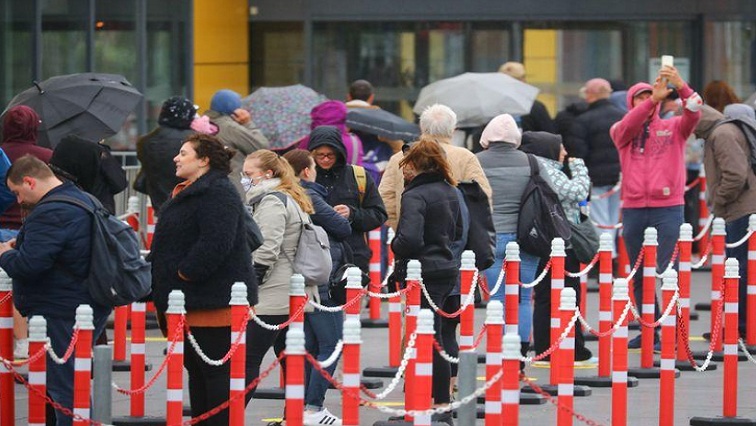Global alarm was sounded on Monday over a potential second wave of coronavirus infections, after Germany reported that the disease was again spreading faster just days after the first tentative steps there to ease a lockdown.
News that the “reproduction rate” – the number of people each person with the disease goes on to infect – had surged back to 1.1 in Germany cast a shadow over the reopening of businesses on Monday from Paris hair salons to Shanghai Disneyland. A rate that stays above 1 means the virus is spreading exponentially.
Germany is being closely watched worldwide as the most successful large European country in halting the spread of the virus, thanks to a massive testing programme. Chancellor Angela Merkel has frequently said the reproduction rate must be held below 1 to prevent the health system from being overwhelmed.
Fears that a second wave of infections could stop the reopening of the global economy helped sent share prices lower on worldwide markets, reversing earlier gains.
The past month has seen investors bet strongly on a rapid economic recovery in spite of data far worse than any in living memory. That has opened a rift between soaring stock markets and the freefalling economies they are meant to reflect.
In Europe, the worst-hit continent, Spain and France took major new steps to ease lockdowns, while Britain unveiled cautious moves that critics said sent mixed messages.
In Paris, traffic flowed along the Champs-Elysees as workers cleaned shopfronts to reopen for the first time since early March.
“Everyone’s a little bit nervous. Wow! We don’t know where we’re headed but we’re off,” said Marc Mauny, a hair stylist who opened his salon in western France at the stroke of midnight when the new rules took effect.
Mickey Mouse welcomed thinned-out crowds in Shanghai, the first Disney theme park to reopen, with a strict limit on tickets. Parades and fireworks were cancelled, and workers and guests had to wear face masks and have their temperatures screened.
“I think (these measures) make tourists feel at ease,” said Kay Yu, a 29-year-old pass holder wearing a Minnie Mouse hat.
‘IT’S NOT OVER UNTIL IT’S OVER’
Germany unveiled its plans to reopen last week. Smaller shops have already opened and restaurants and cafes are expected to open their doors soon.
German officials say the estimated reproduction rate or ‘R’ becomes more volatile as the overall number of infections declines, and a brief spike is not necessarily dangerous. After a rise at the weekend, Monday saw new cases fall back again.
Chancellor Angela Merkel, a physicist whose plain-spoken assessments have been held up as models of a scientific approach to the crisis, said it was crucial that “people stick to the basic rules, i.e. keeping their distance, wearing mouth and nose protection and showing consideration for each other”.
Karl Lauterbach, a Social Democrat lawmaker and professor of epidemiology, was worried after seeing large crowds outside on Saturday in his home city of Cologne.
“It has to be expected that the R rate will go over 1 and we will return to exponential growth,” he tweeted. “The loosening measures were far too poorly prepared.”
In South Korea, which largely avoided a lockdown with a massive testing and contact-tracing programme early on, authorities were rushing to contain a new outbreak traced to night clubs.
“It’s not over until it’s over … we must never lower our guard on epidemic prevention,” President Moon Jae-In said on Sunday.
New Zealand, which has stemmed the infection with one of the toughest and earliest lockdowns, said it would open malls, cafes and cinemas this week.
“The upshot is that in 10 days’ time, we will have reopened most businesses in New Zealand, and sooner than many other countries around the world,” Prime Minister Jacinda Ardern told a news conference. “But that fits with our plan – go hard, go early – so we can get our economy moving again sooner.”
But some of the countries and territories that are opening up their economies are not waiting for sustained falls in the spread.
Russia overtook Italy and Britain to report the world’s highest tally of cases after the United States and Spain. Nevertheless, President Vladimir Putin announced plans to ease nationwide lockdown measures from Tuesday.
India, which has locked down its 1.3 billion people since March, reported a record daily rise in cases, yet said it would begin to restart passenger railway services, with 15 special trains, from Tuesday.
Pakistan reopened markets, despite experiencing almost a third of its deaths in the past week.
In the United States, which has the most deaths and cases worldwide, unemployment figures released last week were the worst since the Great Depression. President Donald Trump has been trying to shift the emphasis towards reopening the economy. Many states have begun loosening restrictions, even though cases continue to rise.






